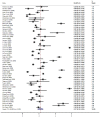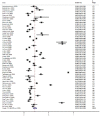Prevalence of depression, anxiety and post-traumatic stress disorder in health care workers during the COVID-19 pandemic: A systematic review and meta-analysis
- PMID: 33690641
- PMCID: PMC7946321
- DOI: 10.1371/journal.pone.0246454
Prevalence of depression, anxiety and post-traumatic stress disorder in health care workers during the COVID-19 pandemic: A systematic review and meta-analysis
Abstract
Objective: The COVID-19 pandemic has placed health care workers under psychological stress. Previous reviews show a high prevalence of mental disorders among health care workers, but these need updating and inclusion of studies written in Chinese. The aim of this systematic review and meta-analysis was to provide updated prevalence estimates for depression, anxiety and post-traumatic stress disorder (PTSD) among health care workers during the COVID-19 pandemic, benefitting from the inclusion of studies published in Chinese.
Methods: Systematic search of EMBASE, MEDLINE, PsycINFO, Global Health, Web of Science, CINAHL, Google Scholar and the Chinese databases SinoMed, WanfangMed, CNKI and CQVIP, for studies conducted between December 2019 and August 2020 on the prevalence of depression, anxiety and PTSD in health care workers during the COVID-19 pandemic. Studies published in both English and Chinese were included.
Results: Data on the prevalence of moderate depression, anxiety and PTSD was pooled across 65 studies involving 97,333 health care workers across 21 countries. The pooled prevalence of depression was 21.7% (95% CI, 18.3%-25.2%), of anxiety 22.1% (95% CI, 18.2%-26.3%), and of PTSD 21.5% (95% CI, 10.5%-34.9%). Prevalence estimates are also provided for a mild classification of each disorder. Pooled prevalence estimates of depression and anxiety were highest in studies conducted in the Middle-East (34.6%; 28.9%). Subgroup and meta-regression analyses were conducted across covariates, including sampling method and outcome measure.
Conclusions: This systematic review and meta-analysis has identified a high prevalence of moderate depression, anxiety and PTSD among health care workers during the COVID-19 pandemic. Appropriate support is urgently needed. The response would benefit from additional research on which interventions are effective at mitigating these risks.
Conflict of interest statement
The authors have declared that no competing interests exist.
Figures




References
-
- WHO Director-General’s opening remarks at the media briefing on COVID-19–11 March 2020. https://www.who.int/dg/speeches/detail/who-director-general-s-opening-re...
-
- COVID-19 Dashboard by the Center for Systems Science and Engineering (CSSE) at Johns Hopkins University (JHU). https://coronavirus.jhu.edu/map.html
Publication types
MeSH terms
LinkOut - more resources
Full Text Sources
Other Literature Sources
Medical

